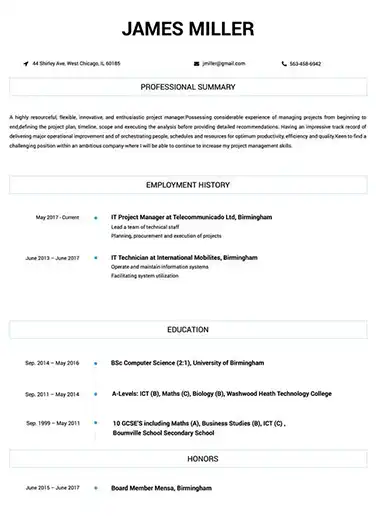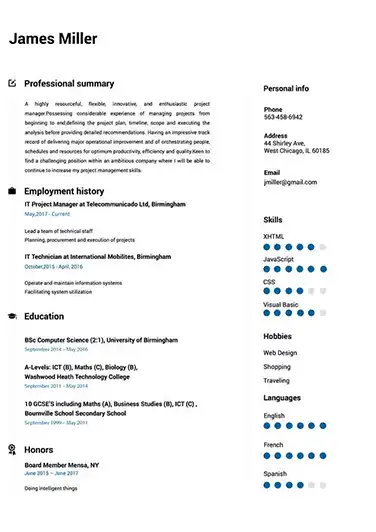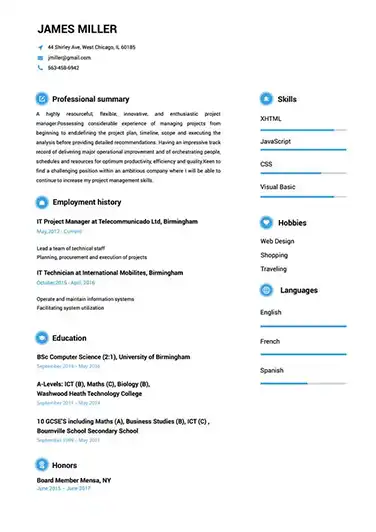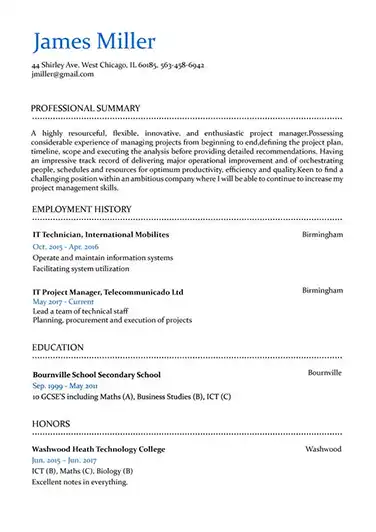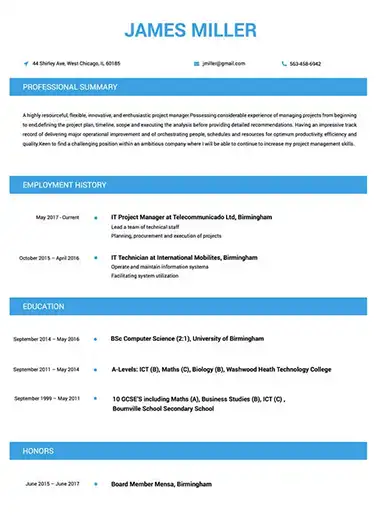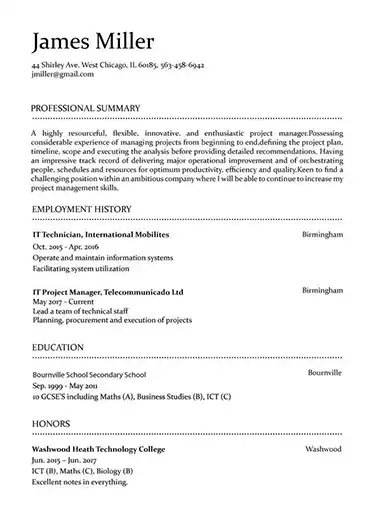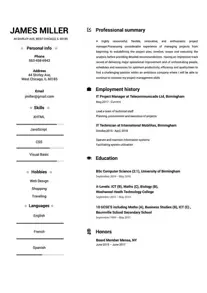 Use This Template
Use This Template
Build your resume in 15 minutes
Create an awesome resume that meets the expectations of potential employers with our selection of professional, field-tested resume templates.
medical assistant: Resume Samples & Writing Guide
yvette.white@mail.com
663-296-6182
Professional Summary
Employment history
- Sterilizing medical instruments
- Maintaining medical records
- Maintaining medical supplies
- Recording patient medical history
- Administering medications
- Sterilizing medical instruments
- Maintaining medical records
- Sterilizing medical instruments
- Answering patient inquiries
Education
Skills
Do you already have a resume? Use our PDF converter and edit your resume.
patterson_kenny@gmail.com
656-638-2266
Employment history
- Maintaining medical records
- Maintaining medical supplies
- Scheduling patient appointments
- Recording patient medical history
- Taking vital signs
- Scheduling patient appointments
- Administering medications
- Maintaining medical supplies
- Recording patient medical history
Education
Skills
bensonvictor@protonmail.com
793-950-4065
Professional Summary
Employment history
- Drawing blood
- Preparing patients for examinations
- Performing laboratory tests
- Preparing and administering injections
- Taking vital signs
- Preparing patients for examinations
- Maintaining medical records
- Assisting with billing and coding
- Maintaining medical supplies
Education
Skills
adam.yates@yandex.com
924-165-2517
Employment history
- Assisting with procedures
- Scheduling patient appointments
- Preparing patients for examinations
- Preparing patients for examinations
- Assisting with procedures
- Answering patient inquiries
- Recording patient medical history
- Drawing blood
- Performing laboratory tests
Education
Skills
vincent-kelly@yandex.com
947-234-8733
Employment history
- Administering medications
- Sterilizing medical instruments
- Drawing blood
- Sterilizing medical instruments
- Maintaining medical records
- Assisting with billing and coding
- Maintaining medical supplies
- Answering patient inquiries
- Maintaining medical records
Education
Skills
Not in love with this template? Browse our full library of resume templates
As a certified medical assistant, you’re one of the most versatile allied health professionals that exist. You work directly with patients, you update charts, you field phone calls, and you ensure medical equipment is sterilized and ready for doctors and nurses. In many cases, you even handle co-payments and insurance.
All that’s to say, you have a long list of both clinical and administrative skills. As impressive as that is, it doesn’t always translate to your resume. The medical field in general is exceptionally competitive. And it doesn’t matter how much experience you have; in order to land the job you really want, you need a resume that stands out.
And that’s where we come in. We’re here to help you create a resume that will impress recruiters and clearly convey how well you can keep a medical practice running smoothly.
In this guide, we’ll cover what it takes to write a top-tier medical assistant resume. We’ll even provide HR-approved template examples you can use (or reference for ideas and inspiration should you need it). After reading our top resume writing tips and tricks, you’ll know:
- How to format your resume
- What sections a medical assistant should include in their resume
- How to list your education
- How to list additional training and certifications
- Which soft and hard skills you should highlight on your resume
- The differences between a resume objective and summary (and which one you should include)
- How to write an experience section that emphasizes career achievements
- How to write your resume if you have little or no experience
- How to make your resume stand out from other candidates
Here at ResumeBuild, we’ve done in-depth research to equip you with the knowledge you need to write a resume that will wow recruiters. Job searching doesn’t have to be difficult. Our resume guide will help you start securing interviews in no time.
Multiple template examples
How to write a medical assistant resume that will get you noticed
Writing a medical assistant resume that stands out isn’t as easy as you might imagine. Even if you’ve worked at top medical centers, your resume will get tossed in the trash if it isn’t formatted correctly. If you want to impress a recruiter, you need to know these resume formatting tips.
How to format your resume
A recruiter spends an average of 7 seconds on each resume. In just 7 seconds they’ll decide whether or not they want to interview you. No pressure, right? Okay, it’s a lot of pressure. And that can be nerve-wracking. The good news is, you can actually use it to your advantage.
If you can format your resume in an eye-catching way, you’re much more likely to leave a good first impression. But unfortunately, there is a lot of outdated information on the internet about the best way to format a resume. And if you follow it, you’ll blend in with every other applicant.
Here’s how you should really format your resume if you want to stand out:
- Ensure your resume is one page in length (anything over is excessive)
- Use one-inch margins on all four sides (this helps your resume look crisp and clean)
- Include the following sections on your resume: header, summary, experience, skills, certifications, and education (you can add a volunteer or interest section if you have space for it)
- Be sure to hyperlink your email and phone number so that they are easily clickable (you don’t want a recruiter to have to work to get in touch with you)
- List your experience reverse-chronologically (or by relevance if that makes for sense for you)
- Use bullet points to focus on achievements in your experience section (don’t just list your day-to-day responsibilities)
- Use a modern font that is clean and easily digestible (recruiters are just scanning after all)
- Use headers and subheaders to break up each section (and make them stand out)
- Always save and export as a PDF (this way the formatting won’t get messed up when someone else opens the file)
This is not an exhaustive list of resume formatting guidelines, but it’s a good place to start. When it comes to resume design, always remember that simplicity is key. Your medical assistant resume should be easy to read with ample white space. If you try to add as much information as possible, it will quickly become crowded and difficult to digest. Doing so definitely does more harm than good.
If CEOs and other high-level business executives can easily keep their resume to one-page, so can you. If you’re struggling to do that, only add in the most relevant information. If it’s not important to the job you’re applying to, remove it. Hiring managers don’t want to sift through things that don’t relate to the position you’re applying for. So whatever you do, keep in concise.
What should a medical assistant put on a resume?
Okay, so you know you need a resume header, summary, experience, skills, certification, and education section, but what actually goes in each one?
Your header should include your name (in large font), your phone number, and your email. It isn’t necessary to put a physical address. This is an outdated practice. No one sends mail for hiring purposes anymore. Everything is done online or over the phone. Disclosing your address could also prevent you from getting called in for an interview if you live too far away. It’s technically illegal to discriminate this way, but many recruiters are guilty of it—whether or not they’re aware.
In the summary section, you’ll want to highlight your previous experience and your most notable career accomplishments. We’ll cover more on that below.
In the experience section, recruiters will look to see what kind of administrative, healthcare equipment, and patient experience you have. Every medical assistant position is a little bit different and they’ll want to hire someone who has had similar responsibilities in the past. That’s why it’s so important to tweak your resume for each position you apply to. Sending the same resume out over and over again is unlikely to lead to many interviews. In this section, they’ll also look for achievements. At the end of the day, they know what a medical assistant typically does. More than anything, they want to know how well you do it. We’ll touch on that more later on in the guide.
In the skills section, they’ll look for hospital software experience, bedside manner skills, and interpersonal skills that will help you succeed. For medical assistants especially it’s important to include both hard, industry-specific skills as well as soft, interpersonal skills. We’ll show you how later on.
In the certification section, they’ll look to see what—if any—certifications you have. Although they’re not a requirement to work as a medical assistant, they can make you a much more competitive candidate.
And lastly, they’ll look at your education section to see your highest level of education. So how exactly should you list it?
How to list your education in a medical assistant’s resume
How you list your education will depend on whether or not you’re an entry-level medical assistant. If you are, you’ll want to include the name of your college/university, your degree, and any relevant coursework or extra-curricular activities.
If you’ve already been in the workforce for a few years, all you need to include in your education section is your college/university and your degree. You don’t even need to put your graduation date or years attended. Hiring managers don’t care when you finished. They just want to know that you did.
How to list additional training and certifications
If you have additional training or certifications, you can make a separate section for these. The most widely recognized certification for medical assistants is the CMA (Certified Medical Assistant). Another one is the RMA (Registered Medical Assistant). And thirdly is the NCMA (National Certified Medical Assistant). Any of these are fantastic additions to your resume and can help set you apart from other candidates
In addition, things like first-aid training or CPR can also be helpful to include.
Which hard and soft skills should be mentioned on a resume?
Deciding which hard and soft skills to add to your resume can greatly influence your chances of getting called in for an interview. Ideally, your skills section will show that you can get the job done better than anyone else.
But how exactly do you demonstrate that? By highlighting the most sought after skills for a medical assistant. Here’s how to determine what those are.
Read the job posting and make a list of all the required skills as well as any attributes that are mentioned throughout. On a separate list, note all the skills you possess—both hard and soft.
Reference both lists identify the skills that appear on both. These are the ones you should include on your resume. Usually, hard skills can be listed as bullet points. Here are the top hard skills for medical assistants:
- Patient care
- Bedside manner
- Charting
- Initial assessments
- Vital signs and patient monitoring
- HIPAA compliance
- Patient transporting
- Bandaging
- Comfort care
- Wound cleaning
- Dressing patients
- Bathing patients
- Medication administration
- Feeding
- Patient advocacy and support
- Personal hygiene care
- EHR software
- ELMS software
- Sterilization and equipment cleaning
- Medical supply inventory
- Insurance billing and coverage
- Clinical research
Soft skills, on the other hand, require you to give a little more background. What we mean is, simply listing something like “leadership” or “communication” doesn’t mean much unless you can back it up.
So instead of simply listing them, demonstrate them with examples. Think of a time you used the particular skill you want to add to your resume and include a few sentences about the situation. How did leveraging that skill change the outcome?
Here are the top soft skills worth adding to your resume:
- Adaptability
- Attention to detail
- Collaboration
- Communication
- Compassion
- Conflict-resolution
- Critical-thinking
- Decision-making
- Detail-oriented
- Flexibility
- Interpersonal skills
- Leadership
- Organization
- Problem-solving
- Teamwork
- Time management
Lastly, it’s important to remember not to lie or exaggerate on your resume. It can be tempting to add skills you don’t have because you think they “sound good,” but that can get you into trouble—especially in the medical field.
Be honest about the skills you do have and omit any you don’t.
How to highlight your most important achievements in your experience section
We’ve said it once (or twice) and we’ll say it again. Your resume needs to highlight achievements. Simply listing previous job responsibilities is one of the most common mistakes people make when writing their resume.
Don’t get us wrong. It’s certainly helpful to give a recruiter or hiring manager a general idea of what you did at past positions, but it doesn’t really do much to set you apart.
When it comes to your experience section, you want to focus on what you did best. And it’s best to be as specific as possible. Being vague won’t do you any favors.
Here is a right and wrong example.
Wrong experience section:
- Took vital signs, triaged patients, and assisted with patient care
- Helped transfer and transport patients
- Assisted with charting and documentation
These resume bullets are pretty bland. And all they do is describe basic medical assistant responsibilities. Most likely every other candidate will have this same experience.
Right experience section:
- Took vital signs, triaged patients, and assisted with every aspect of patient care in a fast-paced urgent care unit
- Helped transfer and transport patients by bed, cart, and wheelchairs. Received 98% positive feedback from patient satisfaction surveys
- Conducted proper charting and documentation for patients electronic medical record via ELMS with a 12% lower than average error rate
As you can see, this experience section is much more impactful. It talks about the candidate’s job responsibilities *and* it demonstrates how good they are at what they do. Numeric achievements especially can really add to your credibility. Here are some additional ideas to add:
- Number of patients you work with a day
- Number of tests you ran per day
- % of positive feedback
These can all help demonstrate what kind of environment you’re used to working in and how much you’re used to handling.
What are the differences between a resume objective and summary? Where do I use which?
If you’re wondering if you should write a resume objective or a resume summary, don’t worry. You’re not alone. Many people struggle with which to write.
The good news is, you can’t *really* go wrong with either. No one will look at your resume and go, “Oh. They wrote an objective instead of a summary. We can’t hire this person.” That’s just not how it works.
That being said, there’s still a way to determine which one would be better to include. Here are the differences between the two.
A resume objective is centered around the job seeker’s goal. They’re concise—just a few sentences—and are normally tailored to the job you’re applying to. Typically, resume objectives are better suited for recent grads or people with little to no experience.
A resume summary, on the other hand, focuses on your top skills and career accomplishments. It uses your past experience to demonstrate why you’re the best fit for the job. Instead of focusing on the job searcher’s needs, it focuses more on the employers needs.
How to write a resume objective
Your resume objective should include a few specific sentences about what you hope to achieve in your next position.
Wrong: Aspiring medical assistant seeking a full-time position at a Seattle hospital where I continue fine-tuning my skills.
This resume objective is bland and boring.
Right: Certified medical assistant with 2 years of volunteer experience in a fast-paced ER. Seeking a full-time position at a Seattle hospital where I can continue building my skills in patient advocacy, clinical research, and medication administration.
This objective is much more engaging and specific to what the candidate is looking for.
How to write a resume summary
If you’re not an entry-level candidate, a resume summary is better suited for you. A summary should include a brief overview of your previous work experience and most notable career achievements.
Wrong: Medical assistant with 4 years of experience working in a general physician’s office. Skilled in patient care, charting, and sanitizing medical equipment.
This resume summary could be used by any medical assistant with four years of experience. And it doesn’t mention any real accomplishments. And you know what that means? That means it doesn’t stand out. And if you don’t stand out, you won’t impress a recruiter.
Right: An AMA certified medical assistant with 4+ years of experience delivering compassionate patient care in a general physician’s office. Streamlined ER protocols to decrease waiting time by 30%.
This resume summary focuses much more on the candidates achievements. A recruiter can see right away what kind of impact this person can make at their hospital or medical practice.
How to write a caregiver resume with little to no experience
If you’re a caregiver with little to no experience, don’t worry. Everyone has to start somewhere. You can still add information to your resume that will demonstrate your ability to succeed as a medical assistant.
Be sure to include any relevant experience—including volunteer or internship experience. Even if you haven’t worked in a hospital before, there are applicable skills that carry over from other types of positions.
Pick the responsibilities from previous positions that most closely relate to what a medical assistant would do and be sure to feature those on your resume.
How to make your resume stand out
In addition to proper formatting, highlighting achievements, and tweaking your resume for each application, there are a few other things you can do to ensure your resume stands out.
Say it with style
Recruiters read the same verbs over and over. Instead of starting each sentence with “assisted” or “managed,” try to get a little more creative. Power verbs can help further emphasize your achievements and make you more memorable to hiring managers.
Quantify achievements in your experience section
Numbers on your resume are instant eye-catchers. Not only that, but they also add to your credibility. Here are some ways medical assistants can use numbers on their resumes:
- Patients worked with per day
- Operational cost savings
- Patient satisfaction %
- Time saved
Add a pop of color
Adding color to your resume can help it stand out from other black and white documents. In addition to pleasing the eye, it can also differentiate sections on your resume and make it easier to read.
Just make sure you it doesn’t become distracting. Stick to neutral colors and use them sparingly. If you’re unsure which colors to use, look to see what colors are in the hospital’s logo. If they’re too bright or bold, soften them a little bit. And lastly, be sure to keep the text black. If you try to switch the text color to something lighter, it becomes difficult to read.
How Resumebuild.com resume builder tool could be utilized for an easy resume setup
If you’re interested in an easy, professional resume set up, consider Resume Build. We offer 20+ tailored-built, out-of-the-box resume templates that are HR-approved. In just three simple steps you can create a resume that’s sure to stand out.
- Choose a template. All 20 tailored-built templates follow industry guidelines and best practices so your resume passes applicant tracking systems.
- Upload your content. Just copy and paste from your current resume or populate your template with thousands of pre-written examples.
- Download your resume and start sending it off. You’ll land the job you’re looking for in no time at all!
At Resume Build, we know how tough it is to write a top-tier resume. We’re here to do the heavy lifting for you. So, what are you waiting for? If you’re ready to land your dream job, let us help build you your resume today.
medical assistant Job Descriptions; Explained
If you're applying for an medical assistant position, it's important to tailor your resume to the specific job requirements in order to differentiate yourself from other candidates. Including accurate and relevant information that directly aligns with the job description can greatly increase your chances of securing an interview with potential employers.
When crafting your resume, be sure to use action verbs and a clear, concise format to highlight your relevant skills and experience. Remember, the job description is your first opportunity to make an impression on recruiters, so pay close attention to the details and make sure you're presenting yourself in the best possible light.
medical assistant
- Record patients’ medical history, vital statistics, or information such as test results in medical records.
- Explain treatment procedures, medications, diets, or physicians’ instructions to patients.
- Help physicians examine and treat patients, handing them instruments or materials or performing such tasks as giving injections or removing sutures.
- Collect blood, tissue, or other laboratory specimens, log the specimens, and prepare them for testing.
- Contact medical facilities or departments to schedule patients for tests or admission.
- Operate x-ray, electrocardiogram (EKG), or other equipment to administer routine diagnostic tests.
- Perform general office duties, such as answering telephones, taking dictation, or completing insurance forms.
medical assistant
- Receives, screens, interviews, and registers patients; takes and records vital signs, as appropriate to clinic operations.
- Assisting Medical Officer for clinical examinations and perform medical treatment as necessary.
- Preparing and administering medications for patients as directed by the Medical Officer.
- Obtains patient histories, prepares and updates medical charts and associated records, and enters patient data into files.
- Prepare monthly medical report.
- Orders and maintains inventories of supplies, as required to support day-to-day unit clinical and administrative operations.
- Assists in maintaining the cleanliness and serviceability of unit facilities and equipment; arranges for maintenance and repair as needed.
medical assistant
- Conducted pediatric care.
- Administered vacations.
- Phlebotomy.
- Front office patient intake.
- Prepare and process medical insurance claim forms and records.
- Obtained patient Vital signs .
medical assistant
- Authorize drug refills and provide prescription information to pharmacies.
- Perform routine laboratory tests and sample analyses.
- Administer prescribed medications or start intravenous fluids, noting times and amounts on patients’ charts.
- Observe patients, charting and reporting changes in patients’ conditions, such as adverse reactions to medication or treatment, and taking any necessary action.
medical assistant
- Answer patients’ calls and determine how to assist them.
- Measure and record patients’ vital signs, such as height, weight, temperature, blood pressure, pulse, and respiration.
- Work as part of a healthcare team to assess patient needs, plan and modify care, and implement interventions.
- Supervise nurses’ aides or assistants.
medical assistant Job Skills
For an medical assistant position, your job skills are a key factor in demonstrating your value to the company and showing recruiters that you're the ight fit for the role. It's important to be specific when highlighting your skills and ensure that they are directly aligned with the job requirements, as this can greatly improve your chances of being hired. By showcasing your relevant skills and experience, you can make a compelling case for why you're the best candidate for the job.
How to include technical skills in your resume:
Technical skills are a set of specialized abilities and knowledge required to perform a particular job
effectively. Some examples of technical skills are data analysis, project management, software proficiency,
and programming languages, to name a few.
Add the technical skills that will get hired in your career
field with our simple-to-use resume builder. Select your desired resume template, once you reach the skills
section of the builder, manually write in the skill or simply click on "Add more skills". This will
automatically generate the best skills for your career field, choose your skill level, and hit "Save &
Next."
- Data Entry
- Medical Terminology
- Medical Coding
- Medical Billing
- Electronic Medical Records
- Patient Care
- HIPAA Compliance
- Phlebotomy
- Clinical Procedures
- Sterilization Techniques
- Vital Signs
- Laboratory Tests
- Laboratory Procedures
- Medication Administration
- Injections
- EKG
- CPR Certification
- First Aid Certification
- Charting
- Insurance Verification
- Scheduling.
How to include soft skills in your resume:
Soft skills are non-technical skills that relate to how you work and that can be used in any job. Including
soft skills such as time management, creative thinking, teamwork, and conflict resolution demonstrate your
problem-solving abilities and show that you navigate challenges and changes in the workplace
efficiently.
Add competitive soft skills to make your resume stand-out to recruiters! Simply select
your preferred resume template in the skills section, enter the skills manually or use the "Add more skills"
option. Our resume builder will generate the most relevant soft skills for your career path. Choose your
proficiency level for each skill, and then click "Save & Next" to proceed to the next section.
- Communication
- Interpersonal
- Leadership
- Time Management
- Problem Solving
- Decision Making
- Critical Thinking
- Creativity
- Adaptability
- Teamwork
- Organization
- Planning
- Public Speaking
- Negotiation
- Conflict Resolution
- Research
- Analytical
- Attention to Detail
- Self-Motivation
- Stress Management
- Collaboration
- Coaching
- Mentoring
- Listening
- Networking
- Strategic Thinking
- Negotiation
- Emotional Intelligence
- Adaptability
- Flexibility
- Reliability
- Professionalism
- Computer Literacy
- Technical
- Data Analysis
- Project Management
- Customer Service
- Presentation
- Written Communication
- Social Media
- Troubleshooting
- Quality Assurance
- Collaboration
- Supervisory
- Risk Management
- Database Management
- Training
- Innovation
- Documentation
- Accounting
- Financial Management
- Visualization
- Reporting
- Business Acumen
- Process Improvement
- Documentation
- Relationship Management.
How to Improve Your medical assistant Resume
Navigating resume pitfalls can mean the difference between landing an interview or not. Missing job descriptions or unexplained work history gaps can cause recruiters to hesitate. Let's not even talk about the impact of bad grammar, and forgetting your contact info could leave your potential employer hanging. Aim to be comprehensive, concise, and accurate.
Employment history
- Administering medications
- Scheduling patient appointments
- Preparing and administering injections
- Drawing blood
- Assisting with procedures
- Sterilizing medical instruments
- Recording patient medical history
- Maintaining medical supplies
- Educating patients on health maintenance
Education
Skills
Provide your Contact Information and Address Year Gaps
Always explain any gaps in your work history to your advantage.
Key Insights- Employers want to know what you've accomplished, so make sure to explain any gaps using a professional summary.
- Adding extra details and context to explain why you have a gap in your work history shows employers you are a good fit for the position.
How to Optimize Your medical assistant Resume
Keep an eye out for these resume traps. Neglecting to detail your job roles or explain gaps in your career can lead to unnecessary doubts. Grammar blunders can reflect negatively on you, and without contact information, how can employers reach you? Be meticulous and complete.
quentinfranklin@gmail.com
677-772-0657
Employment history
- Preparing and administering injections,
- Answering patient inquirys,
- Performing laboratory test's.
- Assistin with proceduers
- Drawin blood
- Preparin an administerin injections
- "I went to the store and bought some milk
- I went to the store, and bought some milk.
Education
Skills
Include Job Descriptions and Avoid Bad Grammar
Avoid sending a wrong first impression by proofreading your resume.
Key Insights- Spelling and typos are the most common mistakes recruiters see in resumes and by simply avoiding them you can move ahead on the hiring process.
- Before submitting your resume, double check to avoid typos.
medical assistant Cover Letter Example
A cover letter can be a valuable addition to your job application when applying for an medical assistant position. Cover letters provide a concise summary of your qualifications, skills, and experience, also it also gives you an opportunity to explain why you're the best fit for the job. Crafting a cover letter that showcases your relevant experience and enthusiasm for the Accounts Payable role can significantly improve your chances of securing an interview.
White yvette.white@mail.com
663-296-6182
736 Creekwood Drive, Kings Park, NY
11754
UPMC
Pittsburgh, Pennsylvania
UPMC Hiring Team
I am writing to express my interest in the Senior Medical Assistant position at UPMC. As a Medical Assistant with 15 years of experience in the Medical field myself, I believe I have the necessary skills and expertise to excel in this role.
My life experiences have taught me the importance of hard work, dedication, and collaboration. Whether it was on the work, or just personally, I have always been committed to pursuing my goals with passion and tenacity. I am confident that throughout all of these years I have gained the skills and expertise necessary to succeed in this role and be a great asset for UPMC. I am eager to join a team that shares my values and work towards a common goal.
Thank you for considering my application for the Senior Medical Assistant position. I hope you will allow me to show you what I am capable of bringing to your organization and how we can work together to make an impact on the industry.
With gratitude,
Yvette White
663-296-6182
yvette.white@mail.com
Yvette White
Showcase your most significant accomplishments and qualifications with this cover
letter.
Personalize this cover letter in just few minutes with our user-friendly tool!
Related Resumes & Cover Letters

Build your Resume in 15 minutes
Create an awesome resume that meets the expectations of potential employers with our selection of professional, field-tested resume templates.

